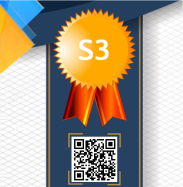TOWARDS SHAPING PUPILS’ SOFT-SKILLS: THE ISLAMIC TEACHING AT A BILINGUAL SCHOOL IN BANDA ACEH
Abstract
The Indonesian educational system should guarantee that educational institutions in all levels not only train their students’ cognitive ability but also develop their affective domain. This important domain can be developed through various strategies, one of which is through shaping students’ soft-skills. This classroom research was conducted to identify strategies implemented by a particular bilingual school in Banda Aceh, in its attempt to develop students’ soft-skills. Having interviewed four teachers and the school principal, observed classroom, and analyzed documents, such as learning module and syllabus, we found that the teachers use various strategies in developing students’ soft-skills, one of which is through inviting students to participate in learning process and to engage in outdoor activities; promoting democratic dialogues; showing empathy and appreciation, and also presenting good examples are seen as important strategies to develop soft-skills.
Keywords
Full Text:
PDFReferences
Barbara A. Ritter, Erika E. Small, John W. Mortimer, and Jessica L. Doll, Designing Management Curriculum for Workplace Readiness: Developing Students’ Soft Skills. Journal of Management Education, Vol. 42 (1), 2018, p. 80–103
Barbara Cimatti, Assessment of Soft Skills and Their Role for the Quality of Organizations and Enterprises. International Journal for Quality Research 10(1), 2015, 97–130.
Corine Glesne. Becoming Qualitative Researchers, the 5th edition, New York: Pearson, 2015.
David Silverman. Doing Qualitative Research. The 5th edition, Los Angeles, London, New Delhi, Sage Publication, 2017.
Earl Babbie, The Basic of Social Research, the 7th edition, Boston: Cengage Learning;
David Silverman, Interpreting Qualitative Data, the 6th edition. Los Angeles, London, New Delhi, Sage Publication, 2020.
Ekram & Mohamed Rida Beshir, Meeting the Challenge of Parenting in the West: an Islamic Perspective. Beltsville: Amana Publications, 2009.
Graham R. Gibb, Analysing Qualitative Data, the 2nd edition, , Los Angeles, London, New Delhi, Sage Publication, 2018.
H Russell Bernard, Amber Wutich, Gery W. Ryan, Analysing Qualitative Data: Systemic Approaches, he 2nd edition, Los Angeles, London, New Delhi, Sage Publication, 2017.
Hairuzila Idrus, Hazadiah Mohd. Dahan, Normah Abdullah, Challenges in the Integration of Soft Skills in Teaching Technical Courses: Lecturers’ Perspectives, Asian Journal of University Education. Vol. 5 (2), 2000. 67-81.
Hyungshim Jang, Johnmarshall Reeve, Edward L. Deci, Engaging students in learning activities: It is not autonomy support or structure but autonomy support and structure. Journal of Educational Psychology, 102 (3), 2010, 588–600.
Ira Shor, Empowering education: Critical teaching for social change. Chicago and London: University of Chicago Press, 1992.
Janet Currie, Early Childhood Education Programs. Journal of Economic Perspectives, Vol. 15 (2), 2000, p. 213–238.
John W. Creswell, Research Design: Qualitative, Quantitative, and Mixed methods Approaches. Los Angeles, London, New Delhi, Sage Publication, 2014.
Karen Littletone and Christine Howe, Educational Dialogue: Understanding and Promoting Interactive Interaction. London and New York: Routledge, 2010.
Kristiina Kumpulainen, Insights into Finnish Early Childhood Education and Care, Practical Literacy, Vol. 2 (3), 2019.
Maria Cinque, Lost in translation”. Soft skills development in European countries, Tuning Journal for Higher Education, V. 3 (2), 2016, 389-427.
Merrill Harmin & Melanie Toth, Inspiring active learning. A complete handbook for today’s teachers. Alexandria: ASCD, 2006.
Muhamed Rida Beshir, Family Leadership: An Obligation to Fulfill, Not an Excuse to Abuse. Beltsville: Amana Publications, 2009.
Paichi Pat Shein; Wen-Bin Chiou, Teachers As Role Models for Students' Learning Styles, Social Behavior and Personality: an International Journal, Vol. 39 (8), 2011, pp. 1097-1104.
Peter Mclaren, Revolutionary Critical Pedagogy. Journal of Education and Information Studies. 6 (2), 2010.
Ron Best, Education for Spiritual, Moral, Social and Cultural Development. New York. Continuum, 2000.
Shaheen Majid, Zhang Liming, Shen Tong, Siti Raihana, Importance of Soft Skills for Education and Career Success, International Journal for Cross-Disciplinary Subjects in Education (IJCDSE), Special Issue, Vol. 2 (2), 2012.
Steven Wolk, A Democratic Classroom. Portsmouth: Heinemann, 1998.
Susan Edwards & Amy Cutter Mackenzie, Environmentalising Early Childhood Education Curriculum through Pedagogies of Play. Australasian Journal of Early Childhood Education. Vol. 36 (1), 2011, p. 51-59.
Susan Edwards & Amy Cutter Mackenzie, Environmentalising Early Childhood Education Curriculum Through Pedagogies of Play. Australasian Journal of Early Childhood Education. Vol. 36 (1), 2011, p. 51-59.
Tafseer Ibn Kathir (online-http://www.qtafsir.com)
Tehmina N. Basit ‘My parents have stressed that since I was a kid’: Young minority ethnic British citizens and the phenomenon of aspirational capital, Education Citizenship and Social Justice, vol. 7, 2012, p. 129-143
Tehmina N. Basit, I Want More Freedom, but Not Too Much: British Muslim Girls and the Dynamism of Family Values, Gender and Education, vol. 9, 1997, p. 425-39.
Tehmina N. Basit, White British; dual heritage; British Muslim: Young Britons’ Conceptualisation of Identity and Citizenship, British Educational Research Journal, Vol. 35, 2009, p. 723-743.
Teuku Zulfikar (2013). Looking from within: The progressive education in Indonesia. International Journal of Progressive Education. Vol.9 (3), p. 124-136.
Teuku Zulfikar, (2009). The Making of Indonesian Education: An overview on empowering Indonesian teachers. Journal of Indonesian Social Science and Humanities. Vol.2, 2013, p. 13-39.
Tony Brooks, Early Childhood Education, Communiqué, Vol. 48 (3,) 2019.
Wayne John Martino, Male Teachers as Role Models: Addressing Issues of Masculinity, Pedagogy and the Re-Masculinization of Schooling, Journal Curriculum Inquiry, Vol. 38 (2), 2008
Wilfred Carr and Stephen Kemmis, Becoming Critical Education, Knowledge and Action Research. Melbourne: Deakin University Press, 2003.
DOI: http://dx.doi.org/10.22373/jid.v20i2.5409
Refbacks
- There are currently no refbacks.
except where otherwise noted.



